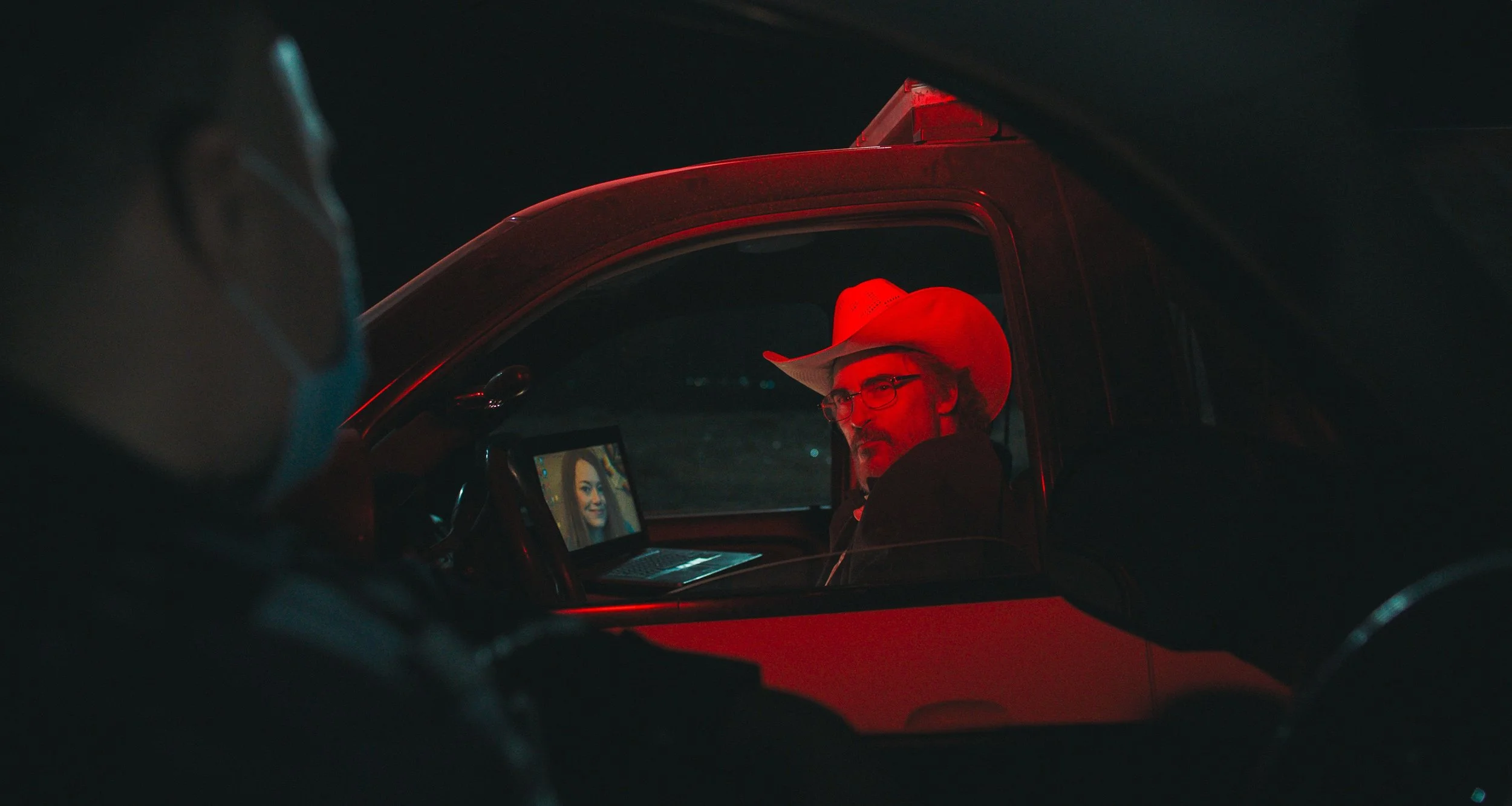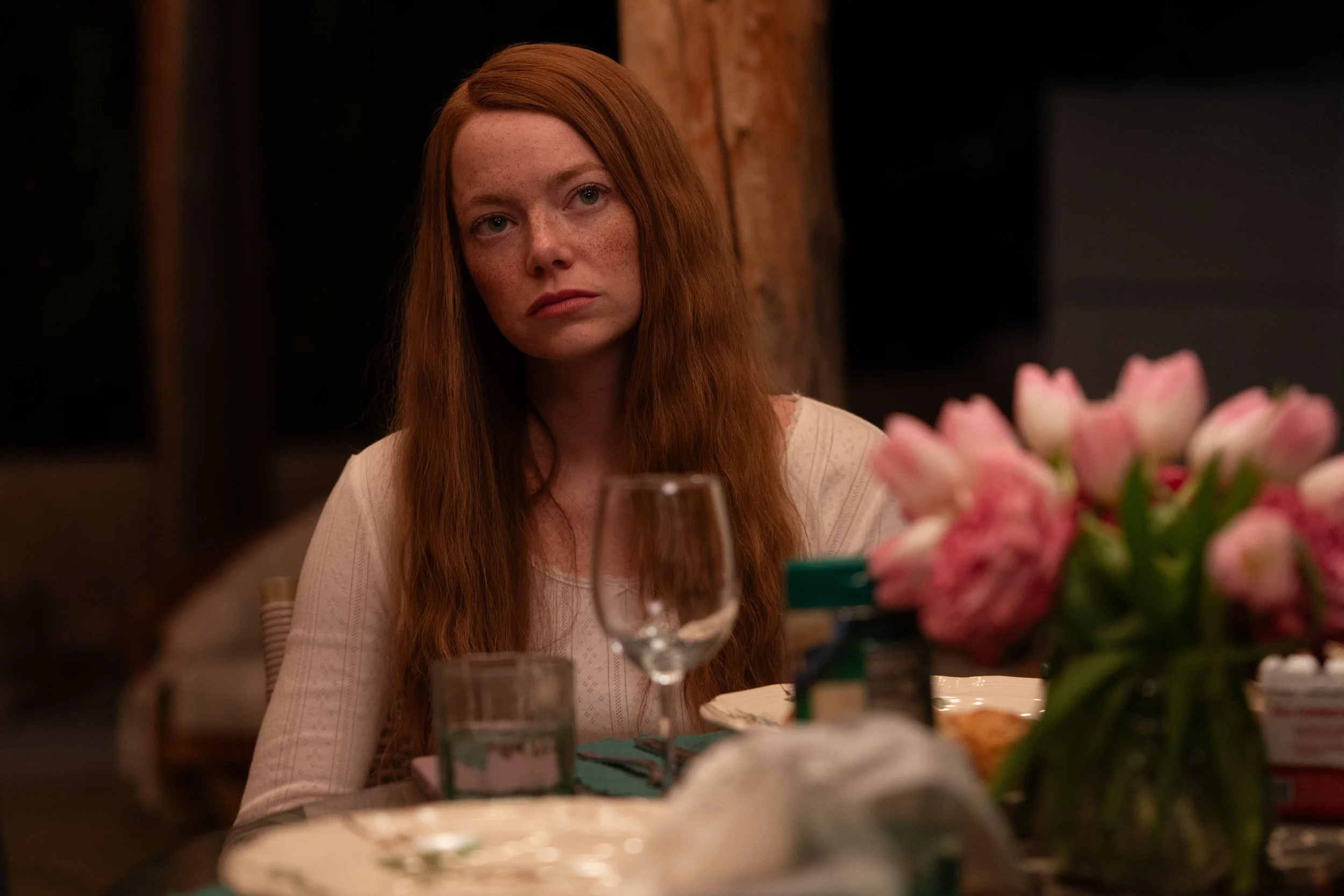‘Eddington’ Review: Ari Aster’s COVID Reckoning [Fantasia 2025]
Ari Aster attempts to make sense out of a year (and decade) that doesn’t make sense with his latest dark comedy, ‘Eddington’.
It is perfectly natural, healthy, and even welcomed for filmmakers to want to discuss the once-in-a-generation global COVID-19 pandemic within the mainstream public consciousness. Not to trivialize it, as Eugene Kotlyarenko and Judd Apatow did in their respective disastrous films The Code and The Bubble, but to attempt to make sense of an event that society is currently trying to pretend never happened. And yet, many are still contracting COVID daily, a virus we’ve resigned ourselves to “let rip” instead of innovating and finding new solutions to ensure we can live safely with pathogens.
However, the COVID-19 pandemic was such a traumatic and dark period for many that the natural reaction of wanting to voluntarily avoid talking about it when hearing the word “COVID” seems perfectly acceptable. We want to ignore that it ever happened, because it robbed us of quality time with friends, family, and loved ones, as we were forced to stay home for an extended period (in Québec, the perpetual on/off lockdown lasted almost two and a half years). Yet, we should be able to reckon with this somber moment in history, because the people who were directly impacted by the disease, either losing a loved one from COVID, or having developed long COVID in the aftermath of an infection, think about it every single day.
The pain doesn’t go away, and it will likely never go away. The millions of people around the world who have had their lives directly impacted by the disease are invisible figures we often won’t see or encounter. Instead of ignoring it and pretend this ordeal never happened, talking about it and reminding us all that, yes, COVID happened (and is still here -- I got it for the first time last year, and WOW! Not fun!) is necessary for us to remember the collective trauma we have suffered openly, in various ways so that we can move on as a society stronger than ever.
Steven Soderbergh expressed the anxieties of living with agoraphobia during COVID brilliantly in his 2022 motion picture, KIMI. He could be the only filmmaker who has captured what it was like to live in a world that doesn’t care about others, while the most vulnerable, who don’t want to step out of their “safety net,” are left to fend for themselves. Yet, no other mainstream director seemingly wants to talk about COVID in a thoughtful light or attempt to comprehend the mania we’ve drifted towards after a good chunk of the population began to adopt anti-science/anti-vaccine gobbledygook in response to a very real virus that has permanently disabled and killed millions of people around the world.
Enter Ari Aster, who, with his latest motion picture, Eddington, decides to tackle the subject that must not be named™ and try to discuss it through the prism of a small New Mexican town, and the political confrontations between its local sheriff, Joe Cross (Joaquin Phoenix), and mayor Ted Garcia (Pedro Pascal). Opening the 29th edition of the Fantasia International Film Festival, Aster follows Cross through the early days of the COVID-19 pandemic, where mask mandates and social distancing became the norm, even though the small community of Eddington seems so far removed from what’s currently occurring in the world.
Cross believes in the rabid conspiracy theories that populate the internet, not only regarding COVID not being real and being vehemently anti-mask, but has gone further down the rabbit hole than the frivolous nonsense that has unfortunately cost the lives of many gullible individuals. For example, he reads an article with the title “Is Hillary already at GITMO? As we know, a body double is replacing her,” which generally gives you an idea of how far gone he is in ridiculous conspiracies. That’s why, when Mayor Garcia wants to enforce the state mask mandate and measures to slow the spread of the virus, Cross himself decides to run for Mayor with a platform based on self-serving ideals that prioritize his interests before those of others.
He roams the (empty) streets of Eddington with a truck full of absurd slogans, like “Don’t let Eddington, NM turn into Facebook, NM,” “Get This Virus Out of Office,” with a picture of Garcia prominently featured, or, my personal favorite, “Your Being Manipulated [sic].” The empty buzzwords he sees online are now a part of his life. Joe believes he has now found purpose in giving back the “freedom” that Eddington citizens have lost by infecting others. This is, of course, to the detriment of his wife, Louise (Emma Stone), who is never tended to by Joe, and is constantly ignored, while her mother, Dawn (Deirdre O’Connell), also believes in the same bonked-out theories as her stepson, and has created some of her own focused on Ted.
For a good chunk of the runtime, Aster ruminates in empty provocations that revolve around COVID – insane cameos from people you’d never expect to see in a mainstream film in 2025, a recall of memes that were populated on Twitter at the time (one of them involves MA, so I assume Aster is a fan of Tate Taylor’s film), and buzzwords that remind us of the enshittification of society without ever asking any pertinent questions as to how we’ve gotten this fucked up.
To be honest, though, I’m not sure Aster knows why, and he eventually realizes it. You can’t make sense out of an event that people refuse to acknowledge even happened, with some even denying the mere existence of viruses. The world has gotten shittier, and there’s unfortunately nothing anyone can do to ask themselves how we got here. Is it Donald Trump’s fault? The internet’s? Who knows, and who cares, because at this point, we’re here, and we need to get out of the mess we have created. Truth be told, we may never escape it, and the future society that awaits us is looking increasingly pessimistic by the day.
When this becomes clear, Aster drastically changes register and introduces, in his film, the Black Lives Matter protests in the wake of the death of George Floyd, which shook the world at a time when people were constantly on their screens and doomscrolled 24/7 in attempting to keep up with the latest developments on the pandemic. It's also where people’s appreciation of the film may vary, since Aster doesn’t take a stance on any of the themes and subjects he presents in his movie. One of the central characters becomes “woke” for the sake of impressing a girl he likes (to the detriment of his MAGA-loving, gun-toting parents). There’s no active exploration of why someone who doesn’t believe in what he’s saying suddenly becomes part of a movement for the sake of doing what others are doing.
It's at that point where Aster introduces us to Austin Butler, in a bit part as Vernon Jefferson Peak, a cult leader who has amassed a rabid following simply because he tells them what they want to hear. While Butler is, as always, captivating, his presence adds next to nothing in the exploration of Aster’s central text and only serves as a device for Louise to “break free” of Joe’s egotistical shackles. It feels more like a last-minute addition than something that supports the overall message we should take away from this deranged movie, especially as it progresses to a darker, more nihilistic conclusion than we might have expected.
Because the core of Aster’s Eddington isn’t about COVID, or the response to the Black Lives Matter protests that took America to a place of social unrest, the likes of which we hadn’t seen in this century before. As the filmmaker pulls back on his (purposefully) pee-brained satire, he begins to excavate something deeper than the brain rot COVID left behind and illustrates how humanity will always prioritize their personal needs over those of the collective. It’s the classic exemplification of the Us vs. Them/In-group vs. out-group theory in social studies that makes for the bulk of Aster’s examination of Joe, a man who cannot live without doing things for himself first and foremost before thinking about anyone else.
Warped by social media’s distortion of what can be considered the “objective truth,” Aster ensures we understand how Joe’s ego-trip will only make matters worse for himself, his wife, and eventually, the community of Eddington as a whole. At first, he doesn’t care about the mask rules and tells everyone he doesn’t need to wear any. Then, as tensions rise within the community, he runs for mayor, driven by his ego, and begins to say unfounded things to stay relevant in the wake of Eddington rallying behind Ted. What happens next, I won’t say. However, I’ll just briefly mention that Aster takes a rather dark turn in its second half that feels telegraphed as the protests begin to take form, and cinematographer Darius Khondji’s visual language evolves.
Aster is a real formalist, one who puts a massive emphasis on swift camera moves to exacerbate tension and keep the audience on edge, while simultaneously never leaving the lens away from Joe. Whether in how the camera is constantly blocked or how a second screen will always reflect on his face, Joe’s face is always perceptible, even when his “presence” isn’t entirely seen.
The decision to change cinematographers seemed like a risky one for Aster, as Pawel Pogorzelski has slowly emerged as one of the most thrilling artisans working today, who has developed a tangible shorthand with the filmmaker. However, Khondji has proven himself time and again that he is more than up to the task and perfectly adapts his techniques for Aster’s visual language, which constantly appropriates (and then modernizes) the classic codes of the western, particularly during its blood-splattering climax where a COVID-positive Joe goes toe-to-toe with ANTIFA.
If that doesn’t sound ridiculous, the actual scene itself is far more exploitative than you think, with a bevy of characters getting their body parts completely obliterated by Joe’s minigun, as he escalates an already tense situation further than he should’ve. Khondji’s camera becomes more frantic and eventually transforms itself into an actual first-person-shooter as the violence intensifies and the carnage results in one gnarly death after the next. It all seems senseless and unrelentingly cruel. Then again, this is just like the times we’re living in.
We’d rather believe quacks than actual scientists and have our beliefs confirmed by people who have no idea what they’re talking about. We’d rather stay in our little bubble of delusion than help people who need it the most. We’d rather think about ourselves and our needs than the ones of the Earth, thinking we will be here forever, when, in turn, we’re only here in passing, and life will end much sooner than we think. Joe, in all his delusion, believes all of these things, and the core of his humanity has sadly been corrupted by the toxicity of a screen he constantly looks at to assert himself as the “hero” he thinks he is. In reality, he may be the biggest loser of this entire affair. However, that doesn’t make the insanity of Aster’s film any less thrilling and surprisingly hilarious in how attuned it is to just how fucked we all are.
Perhaps we didn’t need a movie to remind us of this inextricable fact, and perhaps I’ll be going to Hell for laughing at COVID-positive Joe psyching out in the exact same way Phoenix played Beau Wasserman in Aster’s (masterpiece) Beau is Afraid. However, sometimes the best response to catastrophe (or befuddlement) is to laugh it out. That’s all we’ll have left as this planet slowly, but surely, eats itself alive, and we, as humans, go along for the ride.




